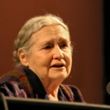Beethoven Was One-Sixteenth Black, and Other Stories
(Libby/OverDrive eAudiobook)
Available Platforms
Description
In this collection of new stories, Nadine Gordimer crosses the frontiers of politics, memory, sexuality, and love with the fearless insight that is the hallmark of her writing.
In the title story, a middle-aged academic who had been an anti-apartheid activist embarks on an unadmitted pursuit of the possibilities for his own racial identity in his great-grandfather's fortune-hunting interlude of living rough on diamond diggings in South Africa, his young wife far away in London. "Dreaming of the Dead" conjures up a lunch in a New York Chinese restaurant where Susan Sontag and Edward Sa+»d return in surprising new avatars as guests in the dream of a loving friend. The historian in "History" is a parrot who confronts people with the scandalizing voice reproduction of quarrels and clandestine love-talk on which it has eavesdropped. "Alternative Endings" considers the way writers make arbitrary choices in how to end stories—and offers three, each relating the same situation, but with a different resolution, arrived at by the three senses: sight, sound, and smell.
More Details
Also in this Series
Published Reviews
Publisher's Weekly Review
Thirteen stories from South African Nobel Prize-winner Gordimer offer a staccato demonstration of how people's origins, inheritances and histories-and the loss of them-are inescapable. The title story centers on the white, twice-divorced academic descendant of a London diamond prospector who visits his forebear's mine in Kimberly, South Africa, and wonders about who in the township, black and white, he may be related to. The narrator of "Dreaming of the Dead" is haunted by famous former companions (the late intellectuals Edward Said and Susan Sontag), while the grieving widow of "Allesverloren" (or "All Is Lost") seeks out her husband's former lover to unearth a message from him. The daughter of "A Beneficiary," meanwhile, finds an unsettling letter among the effects of her late mother, an actress. Cultural inheritance shadows the marriage of a Hungarian couple that emigrates to South Africa in "Alternate Endings: Second Sense," and also the son of "A Frivolous Woman," who resents his flamboyant German-Jewish emigre mother's easy adaptability. Again and again, Gordimer puts big, sweeping disasters (the Holocaust, apartheid) in the pasts of flawed, ill-equipped characters and shows how their choices have been little more than wing beats against history. The results are terrifying, sometimes acidly funny and often beautiful. (Dec.) (c) Copyright PWxyz, LLC. All rights reserved
Library Journal Review
Read by two different narrators, this collection of 13 stories gives a good sense of the diversity of Nobel prize winner Gordimer's work and its longtime focus on relationships, politics, race, and memory. There's also some less expected humor. The situations vary from a Chinese restaurant meal hosted by the late Susan Sontag, to a French cafe with a loquacious parrot and the inner mental gymnastics of people troubled by loss, to the insights of a tapeworm. What may make this audio version of special interest is the differences in the two narrators: David Colacci narrates his selections with a strong and sure sense of the words, while Susan Ericksen seems more attuned to the storytelling voice, though the differences may depend on the stories assigned to them. A recommended choice for libraries whose clientele like audio fiction in its shorter form.--Joyce Kessel, Villa Maria Coll., Buffalo, NY (c) Copyright 2010. Library Journals LLC, a wholly owned subsidiary of Media Source, Inc. No redistribution permitted.
Kirkus Book Review
Ironic what-ifs and narrative legerdemain are featured in the 1991 Nobel laureate's 11th story collection. Several of its 11 pieces are fragmentary, and one suspects they're embryos of fuller stories left unwritten. For example, "A Frivolous Woman" depicts the trouble caused by a German Jewish woman ("A grandmother who'd never grown up") who escapes death at the hands of the Nazis despite refusing to scale back her hyperactive social life, and "Safety Procedures" describes a turbulent airplane flight which nevertheless offers the spectacle of a woman passenger possessed of a preternatural inner calm. In the inchoate title story, Gordimer envisions a future in which whites proudly claim, rather than attempt to conceal, evidence of African descent. She seems to enjoy herself in a nondescript tale ("History") of people whose secrets are revealed by a parrot with a "relentless memory," and a rather better one ("Gregor") that riffs amusingly on Kafka's The Metamorphosis. There's little more than affectionate tribute in "Dreaming of the Dead," which imagines a conversation on "policies and ideologies" conducted in a Chinese restaurant by the late Susan Sontag and Edward Said, joined by South African newspaper editor Anthony Sampson. Gordimer surprises us with "Tape Measure," in which a tapeworm narrator discusses with compressed allegorical ingenuity the strategies of surviving in an unfriendly host (country?), and the perfectly titled "Allesverloren," about a widow who recaptures an ampler understanding of her late husband's life by meeting with his former gay lover. At first appearance a stunt, this beautifully articulated story becomes increasingly dramatic, tense and achingly sad: It's a near-perfect miniature. The volume concludes with "Alternative Endings," which gathers three thematically similar stories whose developments are shaped by the physical senses of sound, sight and smell. It's labored and uninvolving. Mostly finger exercises (think Mozart's shorter works), but the best of them are executed with finesse and power. Copyright ©Kirkus Reviews, used with permission.
Library Journal Reviews
In these tantalizing and provocative short stories, Nobel prize-winning South African writer Gordimer (The Pickup ) experiments with various unusual points of view. The narrator in "Tape Measure," for example, is a tapeworm. "Dreaming of the Dead," meanwhile, is a dream about a fascinating conversation at a Chinese restaurant among the sleeper and the late Susan Sontag and Edward Said. In "Gregor," a narrator who admits to reading Kafka's diaries night after night sees a roach on the display screen of her electronic typewriter, and, with the help of a neighbor, dismantles the screen and destroys the roach. Gordimer raises the question: "What happens if something from fiction is not interiorised, but materializes? Takes in independent existence?" She can be quite playful, e.g., in "Historian," a parrot continually comments on the patrons of the restaurant where his cage hangs. The last three stories, though they all deal with the issue of adultery, arrive through the senses of sight, sound, and smell at three different outcomes. With Gordimer's exquisite use of language, keen insight into social relationships, and elegant writing style in full form, this work is recommended for all libraries. [See Prepub Alert, LJ 8/07.]—Lisa Rohrbaugh, East Palestine Memorial P.L., OH
[Page 67]. Copyright 2007 Reed Business Information.Library Journal Reviews
The Nobel prize winner offers new stories that plumb the past, with characters ranging from an anti-apartheid activist investigating his own racial identity to a parrot who reports the naughty things he's overheard. Copyright 2007 Reed Business Information.
Library Journal Reviews
Read by two different narrators, this collection of 13 stories gives a good sense of the diversity of Nobel prize winner Gordimer's work and its longtime focus on relationships, politics, race, and memory. There's also some less expected humor. The situations vary from a Chinese restaurant meal hosted by the late Susan Sontag, to a French café with a loquacious parrot and the inner mental gymnastics of people troubled by loss, to the insights of a tapeworm. What may make this audio version of special interest is the differences in the two narrators: David Colacci narrates his selections with a strong and sure sense of the words, while Susan Ericksen seems more attuned to the storytelling voice, though the differences may depend on the stories assigned to them. A recommended choice for libraries whose clientele like audio fiction in its shorter form.—Joyce Kessel, Villa Maria Coll., Buffalo, NY
[Page 125]. Copyright 2008 Reed Business Information.Publishers Weekly Reviews
Thirteen stories from South African Nobel Prize–winner Gordimer offer a staccato demonstration of how people's origins, inheritances and histories—and the loss of them—are inescapable. The title story centers on the white, twice-divorced academic descendant of a London diamond prospector who visits his forebear's mine in Kimberly, South Africa, and wonders about who in the township, black and white, he may be related to. The narrator of "Dreaming of the Dead" is haunted by famous former companions (the late intellectuals Edward Said and Susan Sontag), while the grieving widow of "Allesverloren " (or "All Is Lost") seeks out her husband's former lover to unearth a message from him. The daughter of "A Beneficiary," meanwhile, finds an unsettling letter among the effects of her late mother, an actress. Cultural inheritance shadows the marriage of a Hungarian couple that emigrates to South Africa in "Alternate Endings: Second Sense," and also the son of "A Frivolous Woman," who resents his flamboyant German-Jewish migr mother's easy adaptability. Again and again, Gordimer puts big, sweeping disasters (the Holocaust, apartheid) in the pasts of flawed, ill-equipped characters and shows how their choices have been little more than wing beats against history. The results are terrifying, sometimes acidly funny and often beautiful. (Dec.)
[Page 38]. Copyright 2007 Reed Business Information.Reviews from GoodReads
Citations
Gordimer, N., Colacci, D., & Ericksen, S. (2015). Beethoven Was One-Sixteenth Black, and Other Stories (Unabridged). Blackstone Publishing.
Chicago / Turabian - Author Date Citation, 17th Edition (style guide)Gordimer, Nadine, David Colacci and Susan Ericksen. 2015. Beethoven Was One-Sixteenth Black, and Other Stories. Blackstone Publishing.
Chicago / Turabian - Humanities (Notes and Bibliography) Citation, 17th Edition (style guide)Gordimer, Nadine, David Colacci and Susan Ericksen. Beethoven Was One-Sixteenth Black, and Other Stories Blackstone Publishing, 2015.
Harvard Citation (style guide)Gordimer, N., Colacci, D. and Ericksen, S. (2015). Beethoven was one-sixteenth black, and other stories. Unabridged Blackstone Publishing.
MLA Citation, 9th Edition (style guide)Gordimer, Nadine, David Colacci, and Susan Ericksen. Beethoven Was One-Sixteenth Black, and Other Stories Unabridged, Blackstone Publishing, 2015.
Copy Details
| Collection | Owned | Available | Number of Holds |
|---|---|---|---|
| Libby | 1 | 1 | 0 |
































